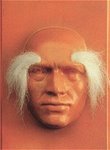
I have lifted this from Chekov because I think it is interesting, insightful and biographical:
You have only one defect ...your extraordinary lack of education...educated people in my opinion must satisfy the following conditions:
1. They respect a man's personality, and therefore are always tolerant, gentile, polite and tolerant. They do not make a riot about a little hammer or a lost rubber; living with others they do not make a favour of it, and when leaving do not say, "It is impossible to live with you!" They excuse noise and cold, and over-roasted meat, and witticisms, and the presence of other people in their house....
2. They are compassionate, and not only with beggars and cats, for they grieve in their soul for what the naked eye does not see...They do not sleep for nights so as to to help their parents pay for their brothers' studies, to buy clothes for their mother....
3. They respect other people's property and therefore they pay their debts.
4. They are pure in heart and fear a lie as they fear fire. They do not lie, even in trifles. A lie is humiliating to the listener, and it debases the speaker before his own eyes. They do not show off; they behave in public just as they behave in home; they do not throw dust in the eyes of humbler people, and do not make up soul to soul conversations when they are not asked. Out of respect people's ears they are often silent.
5. They do not belittle themselves to arouse the compassion of others. They do not play on the strings of other people's souls so that they shall sigh over and fondle them. They do not say: "People don't understand me!" because all that produces is a cheap effect; it is vulgar, musty, false.
6. They are not vain-glorious. They do not care about such false diamonds as acquaintanceship with celebrities, shaking hands with the drunken P__, the raptures of a well-met fellow at the salon, popularity in public houses....Doing a farthing's worth, they do not walk about with their briefcases as if they had done a hundred roubles' worth, and do not boast of having been admitted where others are not admitted.
It's from a letter to his brother and, at times, it shows but it is still interesting.







